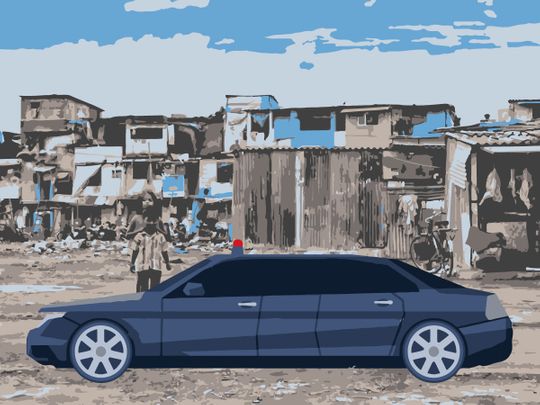
Images of India’s President Ram Nath Kovind bowing and touching the ground of his village on his first hometown visit since assuming the highest office have been splashed everywhere. Emotional or political, his gesture though coincided with a family going into mourning, not too far away.
A 50- year- old woman was caught in traffic that was stopped at a railway overbridge for the presidential train to pass underneath, she was being taken to the hospital for post COVID complications.
The woman who had survived COVID though could not get the better of India’s VIP culture. Her husband’s request to the policeman to allow them through was turned down and doctors say, had she reached on time she would have been alive today.
The apology of Kanpur Police Chief hardly cuts when a life is lost, and the four policemen suspended are default fall guys, missing the woods from the trees is a cultivated art.
India's VIP protocol
The victim is not the first to pay with her life, nor will she be the last -- the whims of VIP protocol mean traffic will once more come to a standstill in some other city, irrespective of emergency or urgency.
A few years ago in Delhi, a man passed away in an ambulance waiting for a VIP convoy to pass. The only lesson we have learnt since then is that some people will always be more equal than others.
In May this year during the intense second wave of the pandemic when ‘every second counts’ got a whole new meaning, another ambulance was sighted in the traffic cordoned off by Ahmedabad police for Indian Premier League (IPL) team Kolkata Knightriders to make their way.
The police, denies the incident but the proof is in the footage. Our outrage is usually short-lived and masks the inevitable resigned acceptance, picking and choosing battles is also a way of life, ours.
VIP bandobast and utter disdain of the common man by their convoys are two sides of the same coin.
The incident of a 16- year-old girl in Punjab who was crushed by a speeding fire tender after she fell from her two- wheeler is hard to forget. The fire tender was part of the convoy of a high court judge who reportedly wasn’t qualified to get this escort.
Nor did it seem that the judge was qualified in some basic things, he did not stop to inquire or help the girl. States often tweak the rules to provide security to whoever catches their fancy or intentions. Many a times, it is not the most deserving.
A colonial hangover
From separate VIP lanes at road tolls to the Rajnikanth swagger at airports, the playing field has no boundaries and Trevor Chappell’s underhand delivery, many versions. In 2018, Madras High Court ordered the National Highways Authority of India to make a dedicated lane for VIPs — judges and babus are an integral part of this list.
“It is disheartening to note that the vehicles of VIPs and sitting judges are stopped at toll plazas,” said the court adding, “it is very unfortunate that sitting judges are also compelled to wait in the toll plaza for 10 to 15 minutes.”
Removing red beacon lights from cars was a start -- but that now seems to be slightly more than optics, like getting a child off your back with a toy. As recently as the second COVID wave, a 100- bed facility was asked to be set up in a five-star hotel for Delhi High Court judges and their families.
‘Jaanta nahi main kaun hoon,’ is a dialogue that came to the movies later. Shiv Sena MP Ravindra Gaikwad once hit an airline staffer with his slippers ‘twenty-five times’ after his seat was changed from business to economy.
Haves and have-nots of society
As though rubbing salt in our wounds, an additional 20,000 policemen were deployed for VIP security in 2019, according to a report by a police think tank affiliated with the Home Ministry. 600 people who pay their taxes get only a single policeman while 3 policemen guard one VIP. This is the real division between the haves and the have nots.
Under-staffed and overworked, hoping for compassion from our police is to first accept that a model state does exist. It isn’t hard though to understand why this vacuous VIP culture flourishes- a man is his entourage. Will have and shall flaunt- across parties, popularity and ideology, status symbol is the prize catch.
It has had a long innings, but there is no political divide in the unwillingness to declare. And our experience shows, words don’t often equal action. Increasing criminalisation of politics also means protection gets a whole new meaning.
Whenever convenient, the colonial era is anathema but what happens when the VIP culture itself is opportune? The common man, fed-up and frustrated is left searching for romance in a stately train. Mahatma Gandhi’s second- class train travel is just for history books, and as things unfold perhaps it will not even feature there some day.
The sarkari vehicle is just a part of the deal, the ‘mai-baap’ culture of pleasing and greasing is the entire package that seeps as quickly as humidity on a dry Delhi summer.
The colonial hangover though has no real hierarchy, the constable in a thana with a stick in his hand is also the king of his castle just as much as that face behind the window who watches his people stoop on the sidelines patiently waiting for their turn to go home. At least one woman didn’t make it.
The Raj is dead, long live the Raj.









